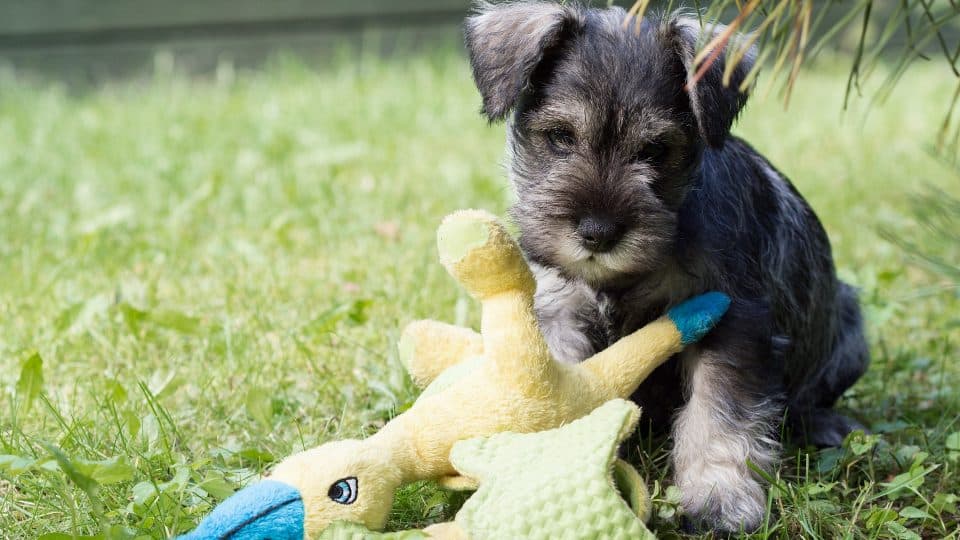Bouncy, playful and full of zip, a schnauzer has a certain zest for life. The German word for snout is “schnaze”, and this dog is all about getting its nose into your business. With a big mustache and human-like eyes, even as a puppy, a schnauzer wants to know everything—and it’s your job to teach them.
With roots that go as far back as the 15th century, the standard schnauzer is the ultimate farm dog. They were initially bred down to the small and miniature sizes so they could fit in between tight corners and catch rats that were causing trouble on the farm. The miniature schnauzer consists of standard schnauzer, Affenpinscher, and poodle. This unique combination gives them a different temperament than other terriers of the same size.
In the early 1900s, they were brought to the US and quickly became a crowd favorite. Though they don’t do much hunting anymore, they’ve won several national awards. Check out the miniature schnauzer Jonesy winning the 2017 Masters Agility Championship, or Ty the giant schnauzer winning the working class group at the 2018 Westminster Dog Show!
Schnauzer puppy facts
It’s hard to look away from the “dog with the human eyes”. Here are some important facts to consider before taking home your schnauzer puppy:
| Size | The miniature schnauzer is small. 12-14 inches at the shoulder and weighs between 11-20 pounds.
The standard schnauzer is 18.5-19.5 inches (male), 17.5-18.5 inches (female) and weighs 35-50 pounds (male), 30-45 pounds (female) And the giant schnauzer is 25.5-27.5 inches (male), 23.5-25.5 inches (female) and weighs 60-85 pounds (male), 55-75 pounds (female) |
| Breed Characteristics | Though the smallest of the three schnauzer breeds, the mini schnauzer is built sturdily like its larger relatives and walks with a confident gait. They have their classic bushy eyebrows paired with their comical beard, which gives this dog a knowing expression.
Their coat is wiry and coarse and comes in three color combinations: salt and pepper, solid black and black and silver. They hardly shed, and are considered hypoallergenic. |
| Temperament | Lively and excited about life, a schnauzer is ready to take on many challenges you can present it with. This breed can acquire a lot of information, so doing monotonous tasks is not on a schnauzers agenda.
The schnauzers are part of the terrier group, so their focus can sometimes be limited. |
| Grooming and Health Needs | Unless you plan on showing your schnauzer in competitions, this breed is relatively low maintenance. They require a monthly bath and frequent brushing due to their double coat. If you do want them “show-ready” however, bring them to the groomer every few weeks to get stripped, and trimmed into the classic schnauzer haircut.
Though schnauzers are a healthy breed, they can be prone to getting cataracts, hyperlipidemia, pancreatitis, liver shunts, and urinary stones. Check with your veterinarian during a check-up about these specific issues. |
| Training | With a pep in their step, schnauzers are ready to please their humans every step of the way. Due to their high intelligence, they can get bored easily, so repetitive activity is discouraged.
Having early socialization classes for schnauzer puppies is a great help in letting them interact with dogs in a gentle way. They’d also do well in canine sports such as agility, obedience, and rally. Schnauzers have a strong prey drive, so they should be on a leash when not in a fenced-in area. |
| Energy Level | Schnauzers are quite active and require daily exercise to feel their best. Due to their small size, however, they can adapt accordingly to the city, suburbian, or country life, as long as their activity requirements are met. If possible, having a backyard or fenced-in area where your schnauzer can roam would be ideal.
Taking them on walks regularly and playing with them in and outdoors will help this pup exercise both their brains and bodies. |
| Life Span | 12 – 15 years |
Who is the best human for a schnauzer?
The schnauzer is a friendly breed that gets along with a wide variety of family members, including children and other dogs. They make surprisingly great watchdogs, ensuring your family is safe from intruders. Due to the small size, the miniature schnauzer varieties are equally comfortable with apartment life but also love the farm life too, as they are still able to hunt those pesky rodents.
As long as you’re able to devote time to your new schnauzer puppy, they will be a wonderful companion for you and your family.
Getting a schnauzer puppy
Choosing to adopt or go through a breeder for your new schnauzer puppy is a personal choice that requires research. Thankfully, there are many resources out there to help you find a rescue or breeder that offers healthy, ethically sourced schnauzer puppies.
Knowing what you’re in for when you get a schnauzer puppy is an important step in being a responsible pet owner. Whether you find a responsible breeder or are planning on adopting, it’s up to you to be prepared for an energetic and friendly addition to your household.
Adopting schnauzer puppies
It may be surprising to know, but adopting a schnauzer puppy is possible.
According to the AKC, most breed rescues report that a majority of their rescue dogs come from individual owner surrender, with the most common reasons being a change in lifestyle or the breed not being right for them. This means that there may be many dogs and puppies out that that are looking for a new forever home.
The main difference between a breeder and a rescue is that a rescue may not always have young puppies to choose from. The benefit, however, is that most are mandated to only adopt out dogs that have been microchipped and spayed/neutered. This means you may end up with a dog that’s already been housebroken, and doesn’t need these common medical procedures. You may also find a schnauzer mix that has all the traits you want from the breed, but with a little extra thrown in.
Finding a schnauzer rescue can be as simple as searching the internet. The AKC also has an excellent list of schnauzer rescues on their site.
Finding a schnauzer breeder
The first step is to do your research. Sadly, there are many puppy mills posing as reputable breeders along with many online scams. Be aware, and reach out to different online forums for conversations about getting your future furry family member.
Be sure to ask questions, make arrangements to meet the parent dogs or mother, and follow your gut. If something seems wrong at a breeder you visit, or the schnauzer puppy seems to good to be true, there’s likely something going on. The AKC also offers resources for finding a breeder, with fairly strict guidelines on who they let participate.
Schnauzer puppy resources
After you find the right schnauzer puppy, it’s time to prepare your home! More than just showering love on your new family member, creating a healthy environment for your pup means storing away a few things and purchasing the right kind of food. Here are a few resources to get you started:
How to Survive the First 24 Hours with Your New Puppy
How Long Can You Leave a Puppy Alone?
How Often Should I Walk my Puppy?
The Essential New Puppy Checklist





